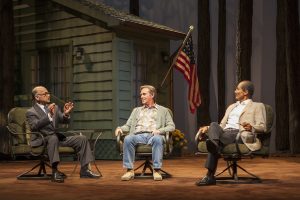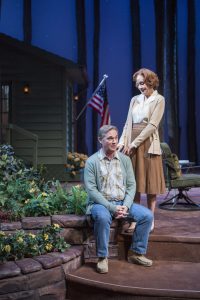Peace! It’s Worth All the Talk at Old Globe ‘Camp David’
“There has been no war between Egypt and Israel for more than three decades.”
That postscript, projected onto the set of Camp David at the Old Globe Theatre, celebrates the premiere diplomatic achievement of the 20th Century, the 1979 peace treaty brokered by President Jimmy Carter and signed in Washington by Prime Minister Menachem Begin and President Anwar Sadat.
And that single pronounced fact transcends not only the subsequent erosion of the agreements and the sad ends of the signers but also the maddeningly tranquil plod of this production.
So what if it’s just two hours of three guys talking? Look at the results: Sadat regained for Egypt the Sinai Peninsula, lost to Israel in the Six-Day War of 1967, and showed the world that Egypt was a modern nation open to world diplomacy. Begin achieved Israel’s first official recognition in the Arab world and eliminated the only serious military threat along its borders.
And, despite all the terrors of militant Islam, the open sores of Palestine, the hangover of the Holocaust and the endless drag of ancient blood-feuds, that peace has held.

Ned Eisenberg, Richard Thomas and Khaled Nabawy, left to right, in Camp David at The Old Globe Theatre. Jim Cox Photo.
Lawrence Wright, a distinguished author, journalist and blues guitarist from Texas, has assembled this play with abundant respect seasoned with awe that three such unlikely leaders, each plagued with troubles at home, divergent backgrounds and personal limitations, could pull off such a feat.
Sadat is seen as urbane and ambitious, flexible but wary of appearances. Begin, the seasoned guerilla commander and Zionist firebrand, retreats into meticulous wrangling over details. One of their first thaws comes in sharing memories of prison, Sadat in solitary for World War II anti-British campaigning, Begin in a Soviet gulag for being, well, Jewish.
Carter is in a world he never made, endlessly aware of the responsibility he has assumed and the unlikelihood of success. All three men pray, to their so-different gods, but Carter prays the most, by far. Partly this is due to the man’s well-known spiritualism and partly it’s a theatrical device for expressing thoughts. But, even though the three-layer prayer makes for a tidy contrast, it also registers sternly that each of the three understands that the stakes are so high that they should any help.
Director Molly Smith doesn’t fight to static nature of the piece, choosing merely to make it serene and even stately. There are three chairs, two unformed Marines and a vintage golf cart to help, there among the trees of the presidential retreat. There’s a quick visit to the Gettysburg Battlefield and a dandy thunderstorm but the main breaks in the ongoing tensions are provided by Roslynn Carter, always quick with the classic Southern wifely remedies of the period, refreshments and gentle insights.
Hallie Foote and Richard Thomas play the Carters with a successful avoidance of cracker gothic but a strong flavor of the regional that made them so exotic in the White House. Thomas is especially adept at an appealing mixture of intellect and self-deprecation made (and still makes) Carter such an effective politician. And Foote? Well, she’s obviously known these ladies.
The Egyptian actor Khaled Nabawy must be considered definitive as Sadat, though his darkly handsome profile is at odds with historic photographs. The accent is right on the edge of perception, alas, which sometimes puts his side at a disadvantage.
When Begin mumbles, it’s the choice of Ned Eisenberg, who so thoroughly inhabits the survivor’s instinctive caution that he alone on this stage can seem invisible.
Walt Spangler’s scenery might be too complicated but it certainly offers depth and texture. Pat Collins has lit the main scenes rather too much in museum style but the passing time of day is graphic and evocative. And the Paul Tazewell costumes, from an uninteresting era, are drearily accurate.
Sadat, a leader any country might be proud of, was a hero at home but suffered from savage censure in most of the Arab world. When he was assassinated two years after signing the treaty, he was not mourned by Islam.
Begin, despondent at the death of his wife, lived the last years of his life in seclusion.
Together, they shared the 1978 Nobel Peace Prize.
Jimmy Carter, a one-term president, continues in his 92nd year, to work for peace.
(Contines at 7 p.m. Tuesdays, Wednesdays and Sundays; at 8 p.m. Thursdays-Saturdays; and at 2 p.m. Saturdays and Sundays through June 19, 201.)

Welton Jones has been following entertainment and the arts around for years, writing about them. Thirty-five of those years were spent at the UNION-TRIBUNE, the last decade was with SANDIEGO.COM.



